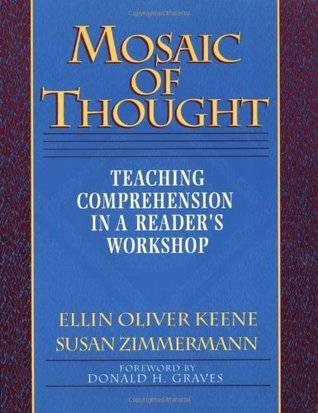

Mosaic of Thought: Teaching Comprehension in a Reader's Workshop
by Ellin Oliver Keene and Susan Zimmermann
How do students become thoughtful, independent readers who comprehend text at a deep level?To find the answers, authors Keene and Zimmermann embarked on a journey into the thought processes of proficient readers - a journey through poems and essays, classrooms and workshops, humor and reflection. "Mosaic of Thought "chronicles that journey, which ultimately led the authors to elaborate on eight cognitive processes identified in comprehension research and used by successful readers. These serve as models for the strategies offered in this book - strategies intended to help children become more flexible, adaptive, independent, and engaged readers."Mosaic" proposes a new instructional paradigm focused on in-depth, explicit instruction in the strategies used by proficient readers. The authors take us beyond the traditional classroom into the literature based, workshop-oriented classrooms. Through vivid portraits of these remarkable environments (all participants in the Denver-based Reading Project of the Public Education & Business Coalition), we see how explicit instruction looks in dynamic, literature-rich readers' workshops. As the students connect to background knowledge, create sensory images, ask questions, draw inferences, determine what's important, synthesize ideas, and solve problems at the word and text level, they are able to construct a rich mosaic of meaning.Straightforward and jargon-free, "Mosaic of Thought" has relevance to all literature-based classrooms, regardless of level. It offers practical tools for inservice teachers, as well as essential methods instruction for preservice teachers at both the undergraduate and graduate level. Indeed, anyone interested in literacy will benefit from the authors' challenge to rediscover the thought processes that inform our own comprehension.
Release Date:
April 20, 1997

